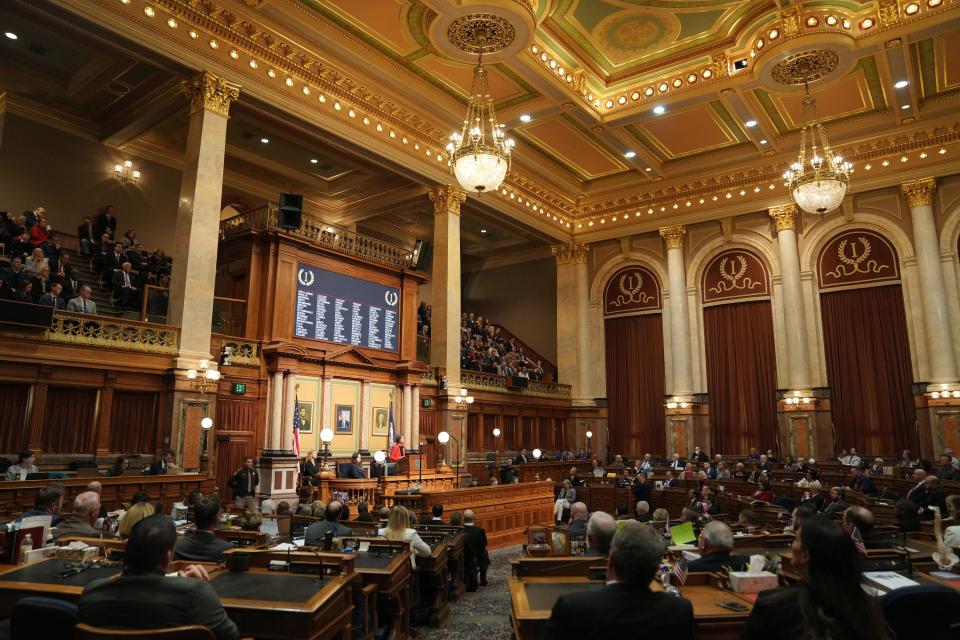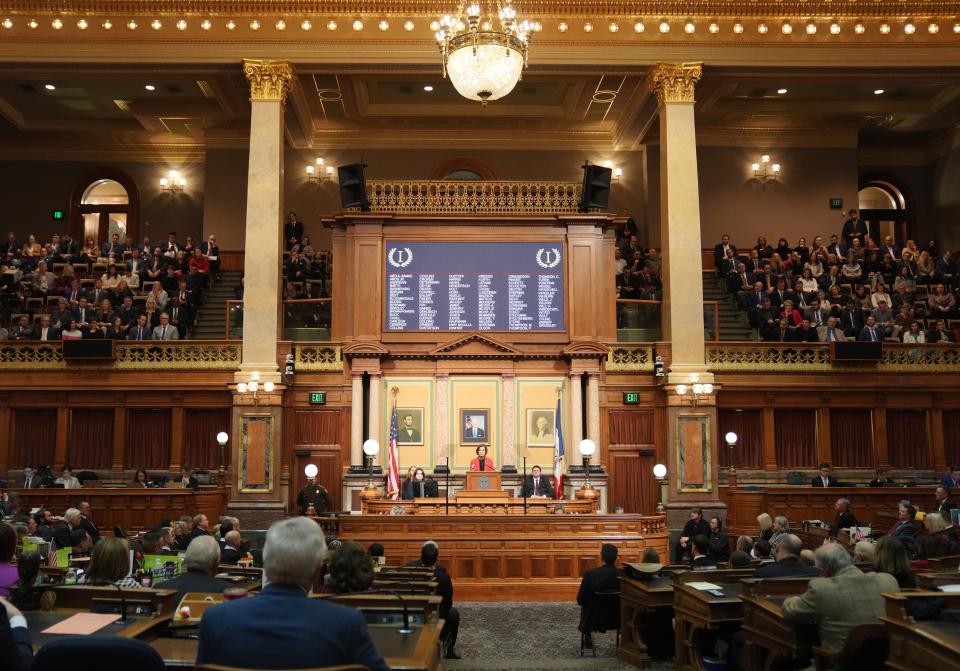Kim Reynolds just released her revised bill to overhaul Iowa's 9 AEAs. Here's what's in it.
- Oops!Something went wrong.Please try again later.
After pushback to her original plan, Gov. Kim Reynolds has rolled out a revised version of her bill to overhaul Iowa's Area Education Agencies, which oversee special education services in schools.
The legislation lays out several of the governor’s education priorities entering the 2024 legislative session, which she first announced as part of her annual Condition of the State address on Jan. 9, including exercising more state control over the AEAs and boosting teacher pay.
It's Reynolds' latest attempt to make widespread changes to Iowa's K-12 schools after leading passage of a law last year allowing families access to taxpayer-funded savings accounts to pay private school costs.
More: Kim Reynolds proposes in annual speech to boost Iowa teacher pay, overhaul AEAs, cut taxes
Reynolds released her initial proposal, House Study Bill 542, on Jan. 10, but, after criticism from education advocates and resistance from legislators, she rolled back some of her suggested changes and introduced an amendment that significantly revises the original bill.
Iowa lawmakers will hold a subcommittee hearing on the bill at noon Wednesday in Room 103 of the Iowa State Capitol, where they will take public input.
But what exactly are AEAs? How do they work? And how would Reynolds' bill change them?
Here’s what we know:
What do Iowa's 9 Area Education Agencies do? How would that change?
Iowa’s nine Area Education Agencies provide special education services to schools across Iowa. The agencies, known as AEAs, also offer general education services, such as professional training for teachers and free digital resources, and media services, like graphic design and printing.
Under current law, school districts are automatically partnered with the AEAs and divert their federal and state special education funds toward the agencies. A portion of the AEAs' funding also comes through property taxes.
Reynolds' bill would allow school districts to choose whether to contract with their local AEA for special education and other services — or to discontinue their use of the AEA, instead seeking an alternative provider for special education, professional training or whatever else they need that year.
An earlier version of Reynolds' bill would have required AEAs to focus only on special education services, eliminating their ability to provide media services and general education services. Reynolds walked back that proposal on Jan. 18.
More: Kim Reynolds walks back Area Education Agency changes, allows general education services
Under the amended bill, the AEAs would be allowed to provide non-special education services, including professional development services, media services and other education services — only if a school district requests them.
The AEAs would be able to offer only certain services, such as employing a child welfare liaison or employing a dietitian to support schools' nutrition programs, with the explicit approval of the Iowa Department of Education director.
In her Condition of the State address, Reynolds said each school will “decide how best to meet the needs of their students.”
“If schools like the services from their AEA, they can continue to use them. If they want to use a neighboring AEA instead, they can do that,” Reynolds said. “Or, they can go outside the AEA system — contract with a private company or partner with other districts to share a speech or behavioral therapist. Or they can spend more on special education teachers and put the dollars right into the classroom.”

Schools would have until June 1 to decide whether to continue using their local AEA or to contract with someone new. The change would take effect for the upcoming school year, beginning in the fall of 2024.
Going forward, schools would have to let the AEA know by Feb. 1 each year whether they intend to continue using the AEA's services.
How would Gov. Kim Reynolds' bill change staffing and oversight at AEAs? Will people lose their jobs?
The bill would also give the Iowa Department of Education and other state agencies significantly more control over AEA operations.
Instead of being governed by a board of directors, each AEA would be placed under the supervision of Department of Education Director McKenzie Snow. The AEAs' boards would be given an advisory role.
All nine current AEA directors would be terminated on July 1, and the Department of Education director would appoint new executive directors for each AEA.
More: Kim Reynolds says 'we don't need nine' Area Education Agencies as she proposes overhaul
The Department of Education director would be responsible for setting the salaries of all AEA executive directors, rather than the AEA board under current law.
Each year, the department would review the entire AEA staffing structure, and the director would have the power to decide which AEA positions to eliminate.
The winnowing of AEA services is likely to result in layoffs. The Department of Education would give hiring preference to any laid-off AEA employees who apply for a job with the state.
Already, the department has posted 29 openings for positions in a new Division of Special Education.
The state intends to staff the new division with 139 employees, funded by taking about $20 million that currently goes to the AEAs and sending the money to the state.
"Why you would want to put all that power into the Iowa Department of Ed in Des Moines and take it away from local schools and local AEAs, I have no idea," said Rep. Sharon Steckman, D-Mason City, the top Democrat on the House Education Committee.
Would AEAs keep control of their properties?
The AEAs would also lose the power to manage their own property. The Iowa Department of Administrative Services would take over property ownership for the AEAs by July 1. The AEAs would no longer be allowed to hold real property or enter into lease-purchase agreements.
The Iowa Department of the Blind would take charge of all AEA equipment designed to assist blind or visually impaired Iowans unless the AEA specifically requests to keep the equipment.
Would Iowa AEAs close under Reynolds’ plan?
Reynolds has said it is “categorically false” that she plans to end the AEAs or cut services to families with special needs children.
“In fact, we are not reducing special education funding by one dime,” she said. “We are simply giving control of the funding to those who work directly with your child on a daily basis and taking special education off autopilot, where it has been stuck for far too long.”
But the bill does give the Department of Education director the power to dissolve an AEA or to direct multiple AEAs to consolidate. The AEAs' directors could also choose to dissolve or consolidate voluntarily, subject to the Department of Education's approval.
Reynolds' proposal would also introduce more competition for special education funding. If school districts decide to hire a private company or to hire their own, in-house special education professionals, the AEAs will receive less money than they do now.
Nothing in the bill requires a minimum amount of funding to go to the AEAs or requires school districts to phase out their use of the agencies over time.
Steckman said she believes the bill would result in fewer services provided to Iowa children.
"Bottom line, in the long run this is going to hurt kids," Steckman said. "Period. There’s no way of getting around that."
How would Gov. Kim Reynolds' plan affect Iowa teacher pay?
Reynolds’ proposal would raise the annual salaries for both first-year and experienced teachers in Iowa, the first adjustment of state minimums since 2013.
The current minimum starting salary stands at $33,500 and would increase to $50,000 under the governor’s bill. Teachers with at least 12 years of experience would also see a new mandatory minimum salary of $62,000.
New spending totaling around $73 million would fund the teacher salary hikes.
“We want younger Iowans to see the teaching profession as something to aspire to,” Reynolds said in her Condition of the State speech. “It’s one of the highest callings one can have, so let’s make sure that teacher pay sends that message.”
The governor is also proposing an additional $23 million to create supplemental teacher pay funds, designed to bring districts of all sizes up to speed on salary requirements.

And $10 million in American Rescue Plan dollars would be used to create a “Merit Teacher Incentive Fund” that would “reward teachers for student improvement,” according to Reynolds’ state budget outline.
Democratic legislative leaders said they were encouraged by Republicans’ openness to raising teacher pay but urged them to expand the conversation to include other school staff, such as paraprofessionals and special education providers.
“Are they getting increases?” said House Minority Leader Jennifer Konfrst, D-Windsor Heights. “Some of them make less than $10 an hour, and they’re critical parts of the classroom.”
Katie Akin is a politics reporter for the Register. Reach her at kakin@registermedia.com. Follow her on Twitter at @katie_akin.
Galen Bacharier covers politics for the Register. Reach him at gbacharier@registermedia.com or (573) 219-7440, and follow him on Twitter @galenbacharier.
Stephen Gruber-Miller covers the Iowa Statehouse and politics for the Register. He can be reached by email at sgrubermil@registermedia.com or by phone at 515-284-8169. Follow him on Twitter at @sgrubermiller.
This article originally appeared on Des Moines Register: Here's how Kim Reynolds' bill would overhaul Iowa special education

